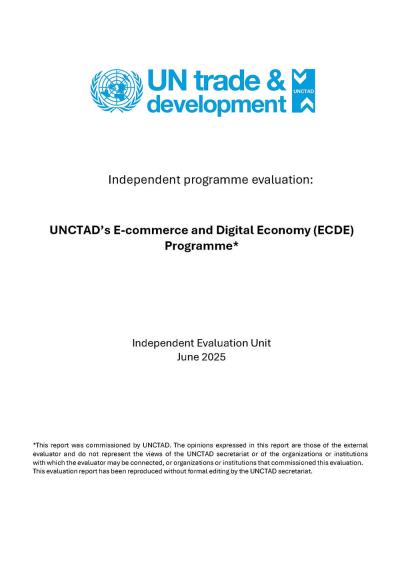
The e-commerce and digital economy programme is independently evaluated every three years, in line with agreements with its core funding partners. The first evaluation was completed by UNCTAD in 2022, and a second, covering 2022–2024, was finalized in 2025. This evaluation assessed progress in implementing previous recommendations and the overall effectiveness of the programme. During this period, the programme moved from a phase of expansion to one of consolidation, focusing on delivering activities that achieve expected results and have a sustainable impact. Stakeholders reported high satisfaction with both the relevance and quality of the programme’s work.
Digital Economy Reports, which influenced global discussions on data governance and incorporated environmental sustainability, began to be integrated into policymaking. However, a comprehensive outreach strategy remains absent, and targeted dissemination initiatives remain underutilized despite strong demand from stakeholders.
A key recommendation for enhancing the capacity to measure the digital economy and trade was addressed through updated training and a revised Handbook on Measuring Digital Trade (2023), developed in collaboration with the IMF, OECD, WTO, and regional bodies. While inclusion of developing countries in digital trade measurement improved, further support for the least developed countries is necessary. Intergovernmental work under the programme was positively evaluated, with improved inclusiveness and interactivity. The eTrade for All partnership was recognized for networking potential, though its full capacity has yet to be realized.
The eTrade for Women initiative contributed to business growth for women entrepreneurs, although challenges remain in fully implementing inclusion recommendations, particularly for people with disabilities. Overall, further efforts are needed to strengthen participation and support across the programme. Gender mainstreaming and social inclusion have progressed, with the 2024–2027 work plan reflecting clear commitments to equality and sustainability.
Demand for technical cooperation from member States increased, especially in developing national e-commerce ecosystems and building capacity for digital trade statistics. In light of this growing demand, the evaluation highlighted significant funding constraints, with 80 per cent of activities dependent on extrabudgetary funds, limiting both flexibility and sustainability. The e-trade reform tracker was recognized as a valuable tool for implementing recommendations and enhancing transparency, while collaboration with other UN agencies and partners could be further strengthened.
The following six recommendations were made:
- For the Secretary-General of UNCTAD to increase regular budget funding for the programme, aligning with the outcomes of the sixteenth session of the United Nations Conference on Trade and Development.
- For programme donors to maintain or increase financial support, ideally through the United Nations regular budget, and earmark funds for follow-up initiatives for increased sustainability and impact.
- For the programme to diversify funding by engaging emerging and non-traditional donors.
- For the programme to enhance targeted dissemination of research outputs to improve policy uptake.
- For the programme to prioritize engagement with countries showing commitment to implementing recommendations and further promote the e-trade reform tracker and follow-up support mechanisms.
- For the programme to expand data collection on eTrade for Women outcomes and consider including people with disabilities as an additional subcriterion for masterclass participants when applications are high.


